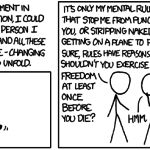We run our website the way we wished the whole internet worked: we provide high quality original content with no ads. We are funded solely by your direct support. Please consider supporting this project.

Does the Open View Undermine God’s Sovereignty?
A common objection to the concept of a risk-taking God is that it seems to undermine God’s sovereignty. If any particular individual can opt out of God’s plan, then every individual could conceivably opt out of God’s plan, and it seems that God’s entire plan for world history could ultimately fail.
Some have argued that if God is not in control of everything, then something must be in control of him which is, they argue tantamount to saying that God does not exists. R. C. Sproul put it this way, “If there is any part of creation outside of God’s sovereignty, then God is simply not sovereign. If God is not sovereign, then God is not God.” If anything is not controlled by God, everything is in jeopardy it seems.
My perspective offers two challenges to this view of sovereignty.
1. An adventurous sovereignty. First, the objection that God is not sovereign unless he controls everything assumes that sovereignty is synonymous with unilateral control. But why should we accept this understanding of divine sovereignty? There are no rational or biblical reasons to suppose that divine sovereignty must or should entail exhaustive, meticulous, divine control.
Can we not conceive of a God who is so great that he dares to create agents who can, to some extent, make autonomous decisions? Can we not conceive of a God who might choose to experiment and risk? Why should we not assume that this is the case—especially since Scripture itself indicates that God does at times experience surprise and disappointment.
Indeed, can we not imagine God growing tired of controlling, or simply foreknowing, everything in meticulous detail from all eternity? If we who are made in God’s image naturally desire a healthy element of novelty, risk and adventure, why should we assume that the opposite is true of God? Conversely, if the total absence of novelty, adventure and spontaneity would be torture for us, why should we assume it is heaven for God?
2. The undermining of divine sovereignty. The definition of sovereignty as control is not only unwarranted; it is, for many of us, not sovereign at all. To speak frankly, it is hard to conceive of a weaker God than one who would be threatened by events occurring outside of his meticulous control. It is difficult to imagine a less majestic view of God than one who is necessarily limited by a unilateral, deterministic mode of relating to his creation.
The central problem with this conception of sovereignty is that there is nothing intrinsically praiseworthy about sheer power. Praise has to do with character. What is praiseworthy about God’s sovereignty is not that he exercises a power he obviously has but that out of his character he does not exercise all the power he could.
Using an analogy from our common experience, I submit that a truly great leader who is sovereign over his kingdom in the most exalted fashion is a leader secure enough in the influence of his leadership and the character he possesses that he does not need to resort to coercion. Moreover, in this light, I contend, the omni-controlling understanding of divine sovereignty must be judged as actually constituting a denial of divine sovereignty.
—Adapted from Satan and the Problem of Evil, 146-150.
Image by Drew Patrick
Category: Q&A
Tags: Determinism, Divine Foreknowledge, Free Will, God's Sovereignty, Open Theism
Topics: Providence, Predestination and Free Will, Responding to Objections
Related Reading

What is the significance of Joel 2:13–14?
“Return to the Lord your God, for he is gracious and merciful, slow to anger, and abounding in steadfast love, and relents from punishing. Who knows whether he will not turn and relent, and leave a blessing behind him…?” As we have seen, God’s willingness to alter his course of action—even after he’s prophetically announced…

What is the significance of Judges 2:20–3:5?
The Lord did not provide any assistance in Israel’s battles, “In order to test Israel, whether or not they would take care to walk in the way of the Lord as their ancestors did” (vs. 22). The pagan opponents of Israel “were for the testing of Israel, to know whether Israel would obey the commandments…

Rethinking Election: Romans 9, Part 1
Many people believe that Romans 9 demonstrates that God has the right and power to save whichever individuals he wants to save and damn whichever individuals he wants to damn. I’ll call this the “deterministic” reading of Romans 9, for it holds that God determines who will be saved and who will be lost. On…

God Clearly Can, So Why Doesn’t He? (podcast)
Leah expects more from God. Should she? Greg confronts God’s inactivity and underperformance. Episode 510 http://traffic.libsyn.com/askgregboyd/Episode_0510.mp3

What is the significance of Exodus 16:4?
The Lord commands the Israelites to gather only enough bread for one day while in the wilderness. “In that way,” the Lord says, “I will test them, whether they will follow my instruction or not.” Testing people to find out how they will resolve their character only makes sense if God is not certain of…

